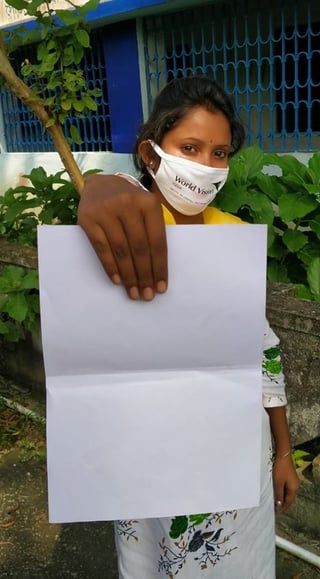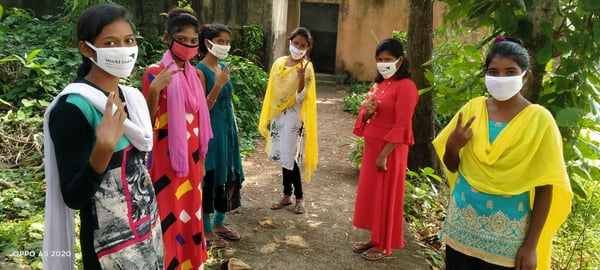 “I love to meet the group because we learn different things,” says Sumona. “I also feel secure coming to the group. If anything happens, we can get help from the group.” If anything happens? What is this ‘anything?’
“I love to meet the group because we learn different things,” says Sumona. “I also feel secure coming to the group. If anything happens, we can get help from the group.” If anything happens? What is this ‘anything?’
When pressed on what the insecurities were before the Girl Power Group (GPG) came together, Puja says, “That time [before the Girl Power Group] no one was there to take care of us. Our parents did not know how to get legal help if anything happened to us.” Again, the ‘anything.’
On the 4th November 2020, a few girls from the ‘Thiyasha’ GPG meet with us on a Zoom call. Thiyasha is the Bengali word for thirst. Sumona, Puja, Mondal, Rinku, Rita and Chandra sit on a few benches outside a school as they try to answer the questions, we have for them. All the girls are in the 10th grade and are 15-16 years of age, except for their leader Sumona, who is 18 and in the 12th grade. They are wearing masks and all you can see are their eyes.
To understand the insecurity and the danger of ‘anything,’ we need to understand the situation these girls are in. The girls do many chores at home. When mentioning chores, Rita says, “There is a little bit of discrimination.” Almost apologetically, she adds, “Not much. Just a little.” The girls talk about cutting vegetables, cooking, sweeping, mopping, fetching water from the village tube well and towards the end of the long list of chores, they awkwardly tell us how their brothers don’t do any of these chores. Rita says, “There is girl on my street. Sometimes her mom gives her less food. I think her mother does not like her as much as her brother.” When pressed for a reason for this behavior she adds, “Maybe they think they will send her away for marriage soon.”
One of the ‘anything’ the girls are talking about is early marriage resulting from the attitudes towards the girl child. If a girl child is to be married and sent away, why would you invest in her health and education? What these communities do not know is that early marriage is one of the ways used to groom, lure and traffic girls. These girls are from a village in the South 24 Parganas district where the prevalence of human trafficking is very high. Now we understand the insecurity the girls felt before the GPG was formed.
“I have been learning from the (Girl Power) modules,” says Puja. “You know, life-skills like dealing with peer pressure, learning what changes happen to the mind and body during adolescence.” These life skills help girls understand the tricks a trafficker might use to lure them. World Vision had to do more than just create a group where the girls can learn about the issue and be of help to each other. Puja says, “The police, the Village Level Child Protection Committee (VLCPC), the Men Care Group, World Vision volunteers, this is like a safe boundary…” Sumona completes her sentence, “…World Vision is standing beside us - we get a response when anything happens. This is a safe boundary.” Guarding this boundary, we need a few anti-trafficking warriors who will continue to protect children after World Vision leaves this community. For this, we selected a few girls who will learn to understand the laws that exist for protection of children and know what goes into rescuing children. World Vision hired an advocate with experience in criminal law who facilitated a one-day workshop with these select leaders of the Girl Power Groups. If ‘anything’ happens to a minor, which law applies to that case? What is the protocol with the child helpline and the police? Where do you get legal help? What is the difference between a First Information Report (or FIR) and an incidence diary, and which one of these should you use to register a complaint when you are at the police station? These were some of the questions the girls were trained on.

There is a long list of ‘anything’ which the girls learn about. Child abuse, child marriage, kidnapping, rape, molestation, trafficking and finally cyber bullying and grooming have specific laws against them.
This boundary, with an anti-trafficking warrior guarding it, was tested when a girl went missing. Sumona had moved to a different locality and one of her friends from her old locality called her and told her about a girl who had disappeared.
Sumona’s mind started to race. She explains what she thought about in those initial moments. “What do we do when a child is in trouble?” She answers her own question right away, “We have the child helpline number, then the local police station. We inform the volunteers (World Vision appointed) and we handle the case.”
Along with the VLCPC, Sumona and the village volunteers (World Vision appointed) went to the girl’s home. This was at the height of the pandemic and the child helpline was inundated with cases of children in difficulty. They needed to act now.
What they found at the girl’s home appalled them. The parents were not worried about the missing daughter. They figured that she had eloped. The fact that she was a 17-year-old child did not matter to them. Their daughter was not a victim, she had left of her own volition, according to them.
Did they know where their daughter was? It turned out that they did. And, it turned out that they knew the boy she had left home with as well. He is a 22-year-old boy from the neighboring village. They expected her to be married to him by now.
The VLCPC explained to them that traffickers use grooming to lure girls out of their homes. And they also explained to them that if they knew that their daughter was going to marry this stranger, then they too would be culpable by law. Child marriage is a criminal offense in India, they warned. The father of the girl went to the boy’s house and brought the girl home the next day. They did not identify the boy because this could lead to his arrest. In this case, the boy and girl were in love, so the girl is waiting to be 18 years of age so she can marry the boy legally. The father and the daughter met the VLCPC and explained this to them.
For now, the girls are not directly involved in cases of missing children because of safety concerns from perpetrators who might seek revenge. Being a part of these discussions and familiarizing themselves with the procedures will help these girls in the long run. “We cannot do anything without the help of the adults,” says Sumona. “They show us the way to handle difficult situations. “
Mondal says, “We are very happy that we could stop that child marriage. We are very happy because a life was saved.” Even though this was not a case of attempted trafficking, stopping this child marriage was important so the law was not broken, and the community knew that there are people looking out for girls. In addition, the next case might involve a child taken against her will.
The future of the girls in the GPG looks good. Puja and Mondal want to be doctors, Rita a teacher, and Rinki wants to start a business of her own. Sumona, our GPG leader, wants to become a Social Worker. “As much as my capacity, power, and influence helps me, I would do the best for children,” she says. “If there is any abuse of child rights, I will use what we learned, and we will use our power. All of us have mobile phones and if anything happens, we can access 1098 (the child helpline number). And we will stand beside whoever is in trouble.” When I ask her, if she wants to become a social worker like Rajkumar (World Vision staff who works in this community), she nods her head in affirmation.
Sumona is very passionate about the protection of children. “We have an idea - we will enroll as many children as we can in our GPG. We want to build a chain so that we get immediate news of anything that happens (to children).”







